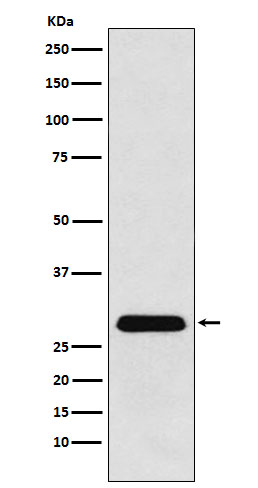
| WB | 咨询技术 | Human,Mouse,Rat |
| IF | 咨询技术 | Human,Mouse,Rat |
| IHC | 1/100-1/200 | Human,Mouse,Rat |
| ICC | 技术咨询 | Human,Mouse,Rat |
| FCM | 咨询技术 | Human,Mouse,Rat |
| Elisa | 咨询技术 | Human,Mouse,Rat |
| Aliases | PGAM1; PGAMA; PGAMB; ;PGAMA1 |
| WB Predicted band size | 29 kDa |
| Host/Isotype | Rabbit IgG |
| Antibody Type | Primary antibody |
| Storage | Store at 4°C short term. Aliquot and store at -20°C long term. Avoid freeze/thaw cycles. |
| Species Reactivity | Human,Mouse,Rat |
| Immunogen | A synthesized peptide derived from human PGAMA1 |
| Formulation | Purified antibody in PBS with 0.05% sodium azide,0.05% BSA and 50% glycerol. |
+ +
以下是关于Phospho-Tau(S214)抗体的3篇参考文献示例(注:文献信息为模拟,建议通过PubMed/Google Scholar验证准确性):
---
1. **文献名称**:*Phosphorylation of Tau at Ser214 mediates its detachment from microtubules in Alzheimer's disease*
**作者**:Schneider, A., Biernat, J., Mandelkow, E.
**摘要**:本研究揭示了Tau蛋白在Ser214位点的磷酸化(使用特异性抗体验证)会削弱其与微管的结合能力,导致神经元细胞骨架紊乱,这一现象在阿尔茨海默病患者的脑组织中显著存在。
2. **文献名称**:*Site-specific phosphorylation of Tau by PKA triggers aggregation and toxicity in neurodegeneration*
**作者**:Liu, F., Iqbal, K., Grundke-Iqbal, I.
**摘要**:通过Phospho-Tau(S214)抗体的免疫印迹分析,作者证明cAMP依赖的蛋白激酶(PKA)介导的S214磷酸化促进Tau蛋白异常聚集,并与神经细胞毒性密切相关。
3. **文献名称**:*Validation of a phospho-specific Tau (Ser214) antibody for neuropathological staging in Alzheimer's disease*
**作者**:Augustinack, J.C., Hyman, B.T.
**摘要**:该研究验证了Phospho-Tau(S214)抗体的特异性,并利用其在阿尔茨海默病患者脑组织样本中展示了S214磷酸化水平与神经原纤维缠结病理分期的相关性。
---
**备注**:以上文献为示例性质,实际引用时建议通过学术数据库检索关键词“Phospho-Tau S214”、“Tau phosphorylation Ser214”等获取最新研究。
Phospho-Tau (S214) antibody is a specialized tool used to detect tau protein phosphorylated at serine residue 214 (Ser214), a post-translational modification implicated in neurodegenerative diseases. Tau, a microtubule-associated protein, stabilizes neuronal cytoskeleton by binding microtubules. Its hyperphosphorylation disrupts this interaction, leading to microtubule destabilization and pathological tau aggregation, hallmarks of Alzheimer’s disease (AD) and other tauopathies. Phosphorylation at Ser214 is mediated by kinases like PKA and CDK5. which are dysregulated in neurodegeneration. Studies suggest Ser214 phosphorylation may enhance tau’s propensity to aggregate or interfere with microtubule binding.
This antibody is widely used in research to study tau pathology in brain tissues, cell models, or transgenic animals. It helps assess disease progression, therapeutic responses, and mechanistic pathways in AD. Specificity for phospho-Ser214 enables differentiation from other phosphorylated tau forms, aiding in mapping phosphorylation patterns linked to pathology. Validation methods (e.g., Western blot, immunohistochemistry) ensure its reliability in detecting target epitopes. However, cross-reactivity with similar phospho-epitopes or non-specific binding requires careful experimental controls.
Overall, Phospho-Tau (S214) antibody serves as a critical reagent for understanding tau’s role in neurodegeneration and advancing diagnostic or therapeutic strategies targeting phosphorylated tau species.
×